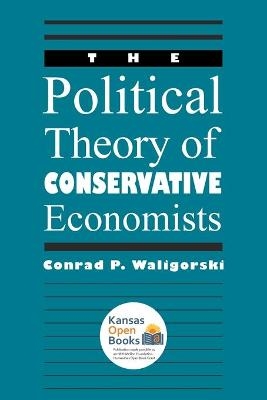
The Political Theory of Conservative Economists
Seiten
2021
University Press of Kansas (Verlag)
978-0-7006-3176-6 (ISBN)
University Press of Kansas (Verlag)
978-0-7006-3176-6 (ISBN)
The conservative thought of economists like Milton Friedman and Friedrick Hayek has provided the framework that undergirds nearly much of current US social-economic policy. Although much has been written about the economic theories of these economists, this study is the first to examine the political theory that underlies conservative economics.
It’s difficult to overstate the impact of conservative economics on American life. The conservative thought of economists like Milton Friedman, James Buchanan, and Friedrick Hayek has provided the conceptual framework that undergirds nearly every aspect of current U.S. social-economic policy. Although a great deal has been written about the economic theories of these Nobel Prize-winning economists, this study is the first to examine the political theory that underlies conservative economics and its implications for public policy.
Long associated with the “Chicago” and “public choice” schools of thought, Friedman, Buchanan, Hayek, and others have consistently repudiated Keynesian principles. They have steadfastly opposed social welfare policies and regulation of private enterprise, championing instead the free market as a mechanism for ordering society.
In this book Conrad Waligorski analyzes the political content of the conservative economists’ arguments. In so doing, he illuminates the political, economic, and philosophical ideas behind and justification for the laissez-faire policy—the reduced regulation, intervention, and welfare favored by conservative governments in the United States, Canada, and Britain.
It’s difficult to overstate the impact of conservative economics on American life. The conservative thought of economists like Milton Friedman, James Buchanan, and Friedrick Hayek has provided the conceptual framework that undergirds nearly every aspect of current U.S. social-economic policy. Although a great deal has been written about the economic theories of these Nobel Prize-winning economists, this study is the first to examine the political theory that underlies conservative economics and its implications for public policy.
Long associated with the “Chicago” and “public choice” schools of thought, Friedman, Buchanan, Hayek, and others have consistently repudiated Keynesian principles. They have steadfastly opposed social welfare policies and regulation of private enterprise, championing instead the free market as a mechanism for ordering society.
In this book Conrad Waligorski analyzes the political content of the conservative economists’ arguments. In so doing, he illuminates the political, economic, and philosophical ideas behind and justification for the laissez-faire policy—the reduced regulation, intervention, and welfare favored by conservative governments in the United States, Canada, and Britain.
Conrad Waligorski is professor emeritus of political science at the University of Arkansas. His publications include John Kenneth Galbraith: The Economist as Political Theorist and Anglo-American Liberalism: Readings in Normative Political Economy.
| Erscheinungsdatum | 01.12.2021 |
|---|---|
| Verlagsort | Kansas |
| Sprache | englisch |
| Maße | 152 x 228 mm |
| Gewicht | 333 g |
| Themenwelt | Sozialwissenschaften ► Politik / Verwaltung ► Politische Systeme |
| Sozialwissenschaften ► Politik / Verwaltung ► Politische Theorie | |
| Wirtschaft ► Allgemeines / Lexika | |
| Wirtschaft ► Volkswirtschaftslehre ► Wirtschaftspolitik | |
| ISBN-10 | 0-7006-3176-3 / 0700631763 |
| ISBN-13 | 978-0-7006-3176-6 / 9780700631766 |
| Zustand | Neuware |
| Informationen gemäß Produktsicherheitsverordnung (GPSR) | |
| Haben Sie eine Frage zum Produkt? |
Mehr entdecken
aus dem Bereich
aus dem Bereich
eine Einführung
Buch | Softcover (2023)
Springer VS (Verlag)
CHF 55,95


